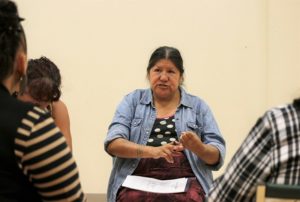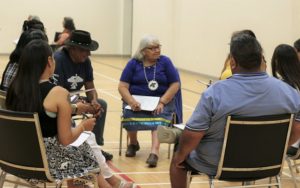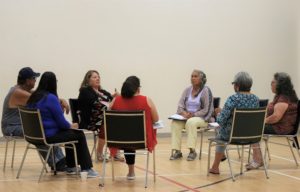Anishinabek Nation Grandparents Committee to guide Child Well-Being Working Group

By Laura Barrios
ALGONQUINS OF PIKWAKANAGAN—The Anishinabek Nation Grandparents Committee met for the first time on July 12 in the Algonquins of Pikwakanagan First Nation.
The committee was formed as part of the implementation of the Child Well-Being Law.
The Anishinabek Nation Child Well-Being Law is the law approved by the Anishinabek Chiefs-in-Assembly by Grand Council Resolution and adopted by the First Nation in accordance with the First Nation law-making process. The Child Well-Being System is a system established pursuant to the Anishinabek Nation Child Well-Being Law to support Anishinabek child and youth well-being and family unity.
“A large number of grandparents across the Anishinabek Nation are the sole caretakers of their grandchildren and are responsible for raising them,” explained Ronnie George, Prevention Services Coordinator at the Anishinabek Nation. “In some situations, grandparents are in poor health, dealing with financial strain, and there are few resources in place to support them, and the ones that are in existence, are not well-known to them or within the community.”
 The purpose of the committee is to guide the Child Well-Being Working Group in the work that they do. As a voice of the grandparents raising their grandchildren, the committee will provide strategic direction and leadership to ensure the empowering of grandparents’ ability to provide safe, long-term care for their grandchildren.
The purpose of the committee is to guide the Child Well-Being Working Group in the work that they do. As a voice of the grandparents raising their grandchildren, the committee will provide strategic direction and leadership to ensure the empowering of grandparents’ ability to provide safe, long-term care for their grandchildren.
During the inaugural meeting, the Grandparents broke off into small working groups to discuss the draft Terms of Reference for the committee, which includes their purpose, mission and responsibilities.
“I’m a grandmother and I feel it’s an honour to be here. I feel I have a lot to offer and to help formulate this group. My heart is in a good place. I feel we can manage this,” said Darla Day-Clancey, citizen of Serpent River First Nation and a social worker. “I believe it’s due to the love in our homes that we do have the resources within our own communities. A goal for me to see in our communities is to support the parents—it’s time that we take care of our own. We need that responsibility back in our communities. We can actually take back our control. We don’t need people telling us about our culture. We have that choice.”
While the participants come from all walks of life, one vision unites them: to see Anishinabek children return to their communities and be surrounded by their families, culture and language.
 “I want to see the changes in my time,” shared Debbie Lemieux, a Sixties Scoop Survivor and grandmother from Wahnapitae First Nation raising her six-year-old granddaughter. “How do we come back from that big system and fight it everyday? We have to stand up to the judges and lawyers. If we keep pushing forward and try to combat that and stay strong in our own way, it will be okay.”
“I want to see the changes in my time,” shared Debbie Lemieux, a Sixties Scoop Survivor and grandmother from Wahnapitae First Nation raising her six-year-old granddaughter. “How do we come back from that big system and fight it everyday? We have to stand up to the judges and lawyers. If we keep pushing forward and try to combat that and stay strong in our own way, it will be okay.”


